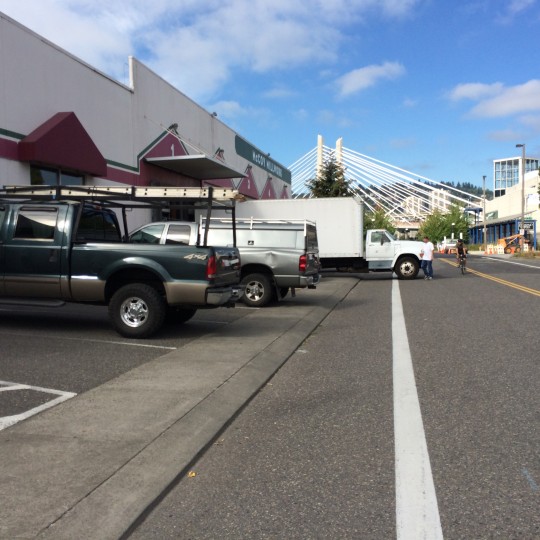
(Photo: Besty Reese)
Anyone who has ridden on SE Caruthers in the pathway gap between the southern end of the Eastbank Esplanade and the start of the Springwater Corridor trail (map) has likely experienced the problem of trucks encroaching on the bike lane. It’s common because two truck-heavy businesses — Apple Foods and McCoy Millworks — have loading docks adjacent to the street and a smooth, mountable curb is all that separates the parking zone from the bike lane.
Now the problem might finally get fixed thanks to an innovative design change coming from the Bureau of Transportation (PBOT). According to PBOT project manager Theresa Boyle, the city is prepping a project that will create “advisory bike lanes” on Caruthers between SE Water and SE 7th.
Advisory bike lanes are different from traditional bike lanes because people are allowed to drive in them — but only when there are no bike riders present. Sound strange? Read on…
Currently, SE Caruthers in this location is a pretty typical cross-section. It has four lanes: one standard lane and one bike-only lane in each direction. The new design will reconfigure the lanes and leave just one lane in the middle and green-colored, advisory bike lanes on each side. Here’s how it looks on Google Streetview:
And here’s how Boyle explained the new design in an email to a volunteer activist who had contacted the city about the bike lane encroachment problems on Caruthers:
“… this is a striping protocol that can be applied to streets with low volumes of vehicles, and high volumes of cyclists.
It allocates more of the paved street area to bike lanes and less overall to cars than is typical. It essentially creates a queuing street for vehicles which is why it is only suitable for low volumes.”
Boyle says the new bike lanes will be eight-feet wide (compared the existing five-foot wide lanes) and there will be one, 16-foot wide “through auto lane” in the middle. Along the southern curb (where the encroachment problems now occur), PBOT will mark an additional four-foot wide buffer zone.
We took a closer look at advisory bike lanes back in 2009 after they were included as a potential facility type in the PBOT Bike Plan for 2030.
Here’s an early draft of a PBOT graphic showing how they work/look:
Adivsory bike lanes are not a PBOT invention. They are widely used in Europe (especially The Netherlands) and the City of Minneapolis also uses them. A presentation put together by PBOT Bike Coordinator Roger Geller (PDF here) explains that advisory bike lanes are typically used when standard bike lanes don’t fit. They’re also a good solution, he says, when there is a higher volume of auto traffic than a neighborhood street.
PBOT is making these changes as part of their Clinton to the River Multi-Use Path project. That project is building a 2.8 mile bike path adjacent to the new Portland-Milwaukie Light Rail line.
To help people understand the new design, PBOT will do a marketing campaign with signs and graphics similar to how they rolled-out bike boxes. If all goes according to plan (it must be dry for the striping to happen), PBOT should have the new lanes striped by the end of next month. If not, it might be next spring before we see the changes on the ground.
Stay tuned.
— For more on advisory bike lanes, see this page from the City of Minneapolis website.



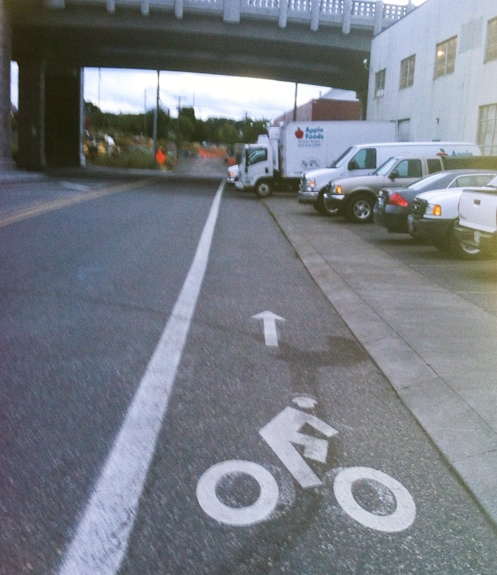
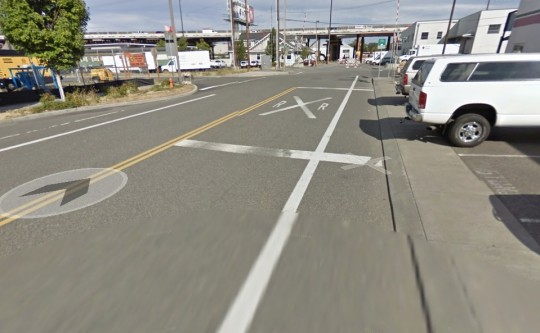
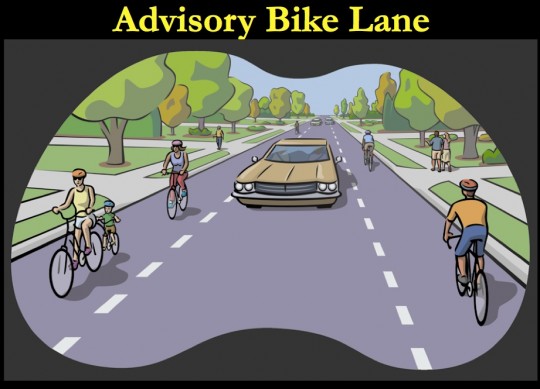
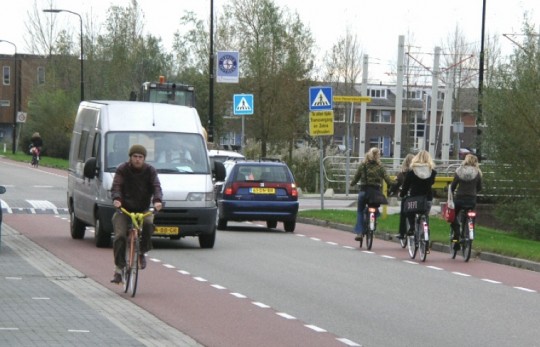
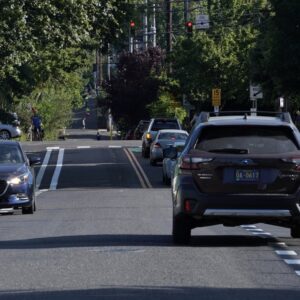
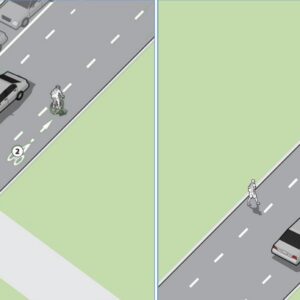


Thanks for reading.
BikePortland has served this community with independent community journalism since 2005. We rely on subscriptions from readers like you to survive. Your financial support is vital in keeping this valuable resource alive and well.
Please subscribe today to strengthen and expand our work.
Was the option of enforcing parked vehicles encroaching in the bicycle lanes considered and then discarded?
harla,
keep in mind that this project is not a direct response to the bike lane encroachment issue. It is part of a larger project and it just happens to be in the same location as where that issue exists… And PBOT likely took this encroachment issue into consideration while considering design alternatives.
…and also the ones blocking parts of the sidewalk…
lots of tickets to be written there if Parking Enforcement did their job…
It’s not clear how often the trucks are “illegally” encroaching on the bike lanes. It’s perfectly legal for a truck to sit in the bike lane when actively loading or unloading. Since the trucks are backed up to a dock, and it’s not possible to see if it’s being actively loaded/unloaded, we don’t actually *know*. (caveat: if the truck is there after business hours, i.e. parked all night, then it’s definitely not legal)
Note – this is for the millwork business on SE Caruthers. (shown in the photo) The trucks on SE 4th are far more frequently obviously illegally parked in the bike lane.
yes your comment is technically correct Matt. But I have observed this location in the past and I have received numerous complaints from others as well. I felt it was safe to say that illegal behaviors were taking place and that the truck operators were in the bike lane longer than the “momentary” time the law allows.
I’ve been stuck backing in to a dock area of insufficient size. Not much I can do about it other than to be safe. Never had a problem with pedestrians or bikes but sports car drivers must get a special exemption on their driver’s license that allows them to drive on sidewalks impatiently.
The problem is multi faceted. After the US trucking industry was deregulated there was a more urgent push for better fuel efficiency and lower labor costs.
Much easier than increasing fuel efficiency in engines is to have longer multi segment trailers that only need one driver while the longer combination vehicle had the same aerodynamic drag as the shorter vehicle.
This lead to ever increasing trailer lengths and combos. There were lots of gory crashes in the 80’s along with oversized access issues so the FHWA instituted the “ISTEA FREEZE” limiting longer trailer lengths.
The upshot is that older historic districts are physically layed out for shorter trailers because the longer ones didn’t exist.
As a driver I really have little choice; I refuse, I get fired. Same goes for the freight company; there are plenty of hungry disreputable operators who will jump at the chance for a freight account no one will touch. The only thing that will keep big trucks out are fines and really big ones levied at the driver AND freight company.
I’ve never delivered to the location in the lesd picture but I’ve taken lots of pictures there. I suspect that the only solution to that dock is to outlaw its use. This would be messy.
And in the “trucker” world there are legal differences between “stopping”, “parking”, “overnight parking” and “unattended parking”.
The “momentary” weasel word for freight vehicles is as useful as requiring the use of a bicycle facility that is “safe and practicable”: neither has a solid definition leaving interpretation up to whomever is there at the time.
Unfortunately, in the case we see in the lead picture, “momentarily” is probably however long it takes to get unloaded. Guessing from the look of places that tiny they probably don’t have full time warehouse staff; likely a desk worker has to come out and manually unload with a unpowered pallet jack. It’s slow and the employees are doing something that they don’t do very often so this slows it down even more.
Thank you, q’Tzal, I appreciate the perspective from the other side of the big truck windshield you provide.
Much rather be pedaling a heavy cargo bike, up a hill, in the summer surrounded by people enjoying ice cream. Oh well.
“yes your comment is technically correct Matt”
Well, no – it’s “correct” – no technically about it. That comment has several caveats. The point is that blanket statements on the illegality of parking on SE Caruthers are invalid – which is also a correct statement. I see what you’re saying, and I appreciate that the wording in the story was modified accordingly, but with all respect, I feel that’s a condescending way to acknowledge the point.
Unfortunately, some of those businesses have to have trucks there, and the city didn’t properly accommodate both them and road users when they put in the bike lanes – it’s not like that truck dock suddenly appeared after PBoT painted the bike lanes. I’m glad the city is addressing the situation, because it needs to be addressed. Hopefully they’ll work something out which accommodates all parties.
Sorry Matt. I should have been more careful with the initial wording in the story and also in my reply to you. I understand your point and it will influence how I approach this issue both here and in other cases in the future. Thanks.
according to PBOT you have a maximum of 30 seconds to park in the bike lane for loading and unloading…
“We have also clarified that stopping to load or unload is permitted for only 30 seconds, not longer.”
That’s how PBoT interprets the statute. That may not be how PPB enforces it, nor how Multnomah County Court judges enforce it. I’d argue those two agencies’ opinions are more relevant. Basically it just means PBoT will (may) issue a ticket if the operator is reported and still there when the enforcement official arrives.
I feel that the trucks (freight operations) have been in place for all people to serve the greater good. and if the name game causes prices to elevate for all. just to make bikes have yet another way to operate the costs should be applied to a tax for bikes to have to pay for all this new option.
http://bikeportland.org/forum/showthread.php?t=3785
Can we get this on NE 43rd between Sandy and Tillamook?? It’s next to the Whole Foods and there are currently narrow door zone bike lanes, no center stripes, lots of trucks and plenty of doors being flung open. I ride well outside the bike lane, as does every other rider on this stretch. Like the idea though!
And on Tillamook from 43rd westward.
These don’t solve the problem of being harassed by speeding drivers while taking the lane to turn left on Division Place. Though I suppose I won’t have to use Division Place if PBOT ever finishes the Clinton to the River path.
I wonder about these advisory lanes being green. Does that then imply to drivers that the green lanes on Stark and Oak are also advisory? Must be confusing to automobile drivers.
Sometimes, it seems too ad hoc. But, I guess that we’re trying to find our way to a better and safer bicycling future.
By taking away travel space for moving vehcles?
imo, the idea that a bikes are vehicles is rooted in car-centric bias. moreover, this biased point of view is used to justify the requirement that cyclists follow discriminatory laws written for and by motorists.
Despite signage, this is going to confuse the bejeezus out of everybody. This ain’t Copenhagen. I would argue that a better option would be to eliminate the bike lanes entirely, set the speed limit at 15mph, and Sharrow the crap out of the lanes.
Portland does not control speed limits in Portland, the state does. By statute, only streets that have 18 feet or less of roadway can be posted at 15 mph.
So narrow the road.
Trucks get extended parking, you get your advisory lanes, but with a 15mph speed limit.
Good idea, but expensive. Concrete $ >>> paint $.
I’m confused by this, too. While I don’t necessarily like the design, this is a rather daring decision by PBOT to increase safety. Let’s at least give them credit for making a change.
Oh get off your pedestal before you get a nose bleed.
The amount of space for bikes is increasing 1.5 times on a street that has very low car traffic. I fail to see how this isn’t a win for people who ride bikes.
As long as PPB tickets trucks blocking the bike lane, wait…
those portland spirit guys are going to love this…
There is still the larger question of ADA access and enforcement of parking blocking the sidewalk pedestrian through zone…I assume that is what the concrete walkway is next to the curb.
I love the option of adding advisory bike lanes to the region’s tool box…used them a lot in Europe and been suggesting them in Vancouver for years: like Evergreen Blvd section in the Reserve area east of downtown…no traction yet. ;-(
Best of luck to PBoT for making this tool real here.
Good idea…how about on the Sullivan’s Gulch overpasses? I’m thinking 53rd and 74th….
It will be interesting to see if motorists figure out that they’re supposed to drive between the dashed lines. 🙂
I don’t see the point of calling for enforcement on the encroachment, really. I mean, the businesses were there first and given the low volume of traffic, there really isn’t a reason to cause a fight here. Let’s pick our battles carefully. All we’d be doing is pissing off 2 businesses, for what? Plus, this way PBoT gets to try out a new treatment.
for what? the ability to walk down the sidewalk… or bike in the bike lane…
for not setting an example that this is ok by allowing them to do it after complaints have been made about them breaking the law…
this isn’t a battle, this is blatant illegal parking… enforcement means we’re asking somebody to do their job…
Huh? This makes no sense. How about advisory car lanes? Advisory traffic lights? Advisory stop signs? It either is a bike lane or it isn’t. No one will understand this. In the event of an accident, it has no legal meaning. The obvious solution is a physically separated cycletrack, like in Europe. If there isn’t enough room, eliminate car/truck space. The businesses should reconfigure their loading docks (parallel or indented into the buidling) so they obey the law, don’t steal public right of way for private use and aren’t set up for a huge lawsuit.
Parking Enforcement would be writing tickets all day if they targeted businesses getting deliveries… usually parked on the sidewalk, often backwards in the street, double-parked… none of them ever get a ticket… capitalism wouldn’t allow that…
Advisory car lanes make a huge amount of sense to me…especially if cars are required to drive as far right as is practical. Any cyclist who treats stop signs as mandatory is a scowling fusspot, ATMO.
“The obvious solution is a physically separated cycletrack, like in Europe.”
1. Advisory bike lanes are common in Europe.
2. Many cycletracks are not physically separated in Europe.
I’m confused. It is a two way street, and has only one lane that is to be used by both directions?
When two trucks are heading toward each other, do they both move to the right, into the advisory bike lane to bypass each other?
What are the risks of an unseen bike rider getting forced off the road or worse, by those trucks?
You’ve got it John. Two-way traffic on a one-lane street. Much like the narrow “queuing” neighborhood streets we have all throughout Portland.
I worked at McCoy Millwork for several years. That loading dock door is used to load out customers, not to receive goods. Most people carry their material out to their truck. A smaller percentage of trucks back up to the door, load out, and are gone in a few minutes. Occasionally a customer might pull up to the door, then go into the showroom to get invoiced out, but it’s rare for a truck to stay there for any length of time. 99% of their receiving is done at the east end of the building. The business has also been there since approx. 1993. Things were a lot different then! Prior to that they were on NW 12th & Flanders. My how things have changed in that neighborhood!!
How platinum-y. Not.
That part of se is industrial land.
This doesnt make sense to me.
The issue appears to be the double yellow striping, which is likely unnecessary.
A solid white line, used for bike lanes, is already advisory. Solid white lines have no legal standing in terms of do not cross. I believe double white lines do have a legal do not cross enforcement mechanism, but Im not 100% sure. Double yellow, of course, means do not cross.
I would remove the double yellow, and keep the bike lanes solid. The idea of adding yet another pattern (dotted white) for the lanes will just add more confusion.
Remember, people take their driving test once. Theres no mechanism to teach people about innovation.
Bike lanes and even advisory bike lanes can most definitely be considered world class, assuming you put them in the right places. Caruthers, with narrow streets, large vehicles and low volumes, is *exactly* the right place to put these.
Advisory bike lanes have the potential to expand out toolbox significantly. They will allow us to put bike lanes on streets that don’t have enough space for conventional lanes, and they’ll allow us to turn some existing narrow 5′ bike lanes into wider 7’+ bike lanes.
“Advisory bike lanes are not a PBOT invention. They are widely used in Europe (especially The Netherlands) … They’re also a good solution, he says, when there is a higher volume of auto traffic than a neighborhood street.”
Is this actually true? I believe in the Netherlands they are mostly used on mostly car-free streets. See for instance this post by David Hembrow. And in Germany they have been used in some non-low traffic situations, but AFAIK they are mostly hated by people on bikes in those situations.
Oops, sorry for not closing that link. In case it doesn’t work.
I ride that section of road just about every workday (and have done so for the past 8+ years). So a few thoughts…
First, this is a very low-traffic, low-speed section of Caruthers. I see more bikes in the automotive lane than in the bike lane, esp. in front of McCoy. Taking the lane is the norm rather than an act of bravery. Between 4th and the Esplanade, it might actually be better to get rid of striping altogether, treating it sort of like a residential street.
Second, I’ve found that, around that intersection, automobiles pose a greater hazard to me on a bike than trucks. Automotive drivers are often lost or looking for a shortcut around traffic; they drive much more erratically, often making unsignaled U-Turns when they realized they’ve hit a dead-end. Truckers, on the other hand, drive slowly and (in my experience) always yield to cyclists.
Third, small local firms like McCoy and Apple are exactly the sort of businesses I’d like to see thrive in Portland. If that involves the horrendously intrusive compromise (note: sarcasm) of having to swerve around a parked truck a few time a month, well, I can live with that.
Complainers: “PBOT only makes small, incremental change. Go out on a limb for once!”
PBOT: “Here, try out this new bike facility. It works great in Europe.”
Complainers: “Bwaaa? I’ve never heard of this. It’ll never work!”
Come on guys, this is good news. How about we try it before we dismiss it?
The problem with the area shown in the pictured area and others like it is that the use in dispute is legal.
A business buys a piece of property and the building on it with the knowledge that it can be used.
IF a jurisdiction decides that a long standing practice (big trucks sticking out in to the road, Sirracha factory making sauce, animal carcass rendering plant [oh vey the stench], metal smelter) is not longer desirable because the increasing density of urban living has encroached upon what was once a sparse quasi-rural zone THEN the jurisdiction must pass laws to make such use illegal.
The consequences of this will be essentially the same as eminent domain because often a business is dependent upon whatever was a minor nuisance historically.
It could be acceptable to grandfather in and exemption for the current tenants to a future prohibition of the use of said dock with the understanding that extra scrutiny will be given to use of same by all parties in compliance with public definitions of “reasonable use” to reduce use that harms the public good.
Like Paul H, I ride that block of Caruthers every day; having patronized McCoy a number of times in the past (and as an aside I must therefore point out that not all the customer vehicles there are trucks), I consider it a wonderful resource and would not want to lose it. I don’t find the occasional truck encroaching onto the sidewalk or bike lane at McCoy to be a significant problem – but I’m less patient with the Apple trucks parked overnight on the next block.
I agree the traffic is low enough that people manage to coexist pretty well on it (much more than the often-aggressive traffic nearby turning onto Division Place, as Ben pointed out) and this new treatment would be a good solution to try.
Since this is a low-traffic street and the trucks need to use its edges, the simplest solution is to eliminate the bike lanes and paint sharrows on it. The bikes are using the whole street anyway when a truck sticks out; why not all the time?
What is the difference between “advisory” bike lanes and sharrows? My guess is that since this design is not covered in the ORS, there is no requirement a) for bicyclists to use them, or b) for drivers to yield to “riders upon an advisory bicycle lane or path”. For low-traffic streets like this, wouldn’t sharrows accomplish the same objective while being slightly less confusing (at least many drivers have seen sharrows before)?
I’m curious as to the legal requirements surrounding “advisory” bike lanes vis-a-vis ORS 814.420, ORS 811.050, and ORS 811.065. Specifically, must riders confine themselves to the area to the right of the dashed line, must drivers yield to riders in such a lane when making right turns, etc., and do safe passing laws that otherwise don’t apply in the presence of a bike lane apply or not apply in the presence of “advisory” lanes? I realize that passing laws would likely be moot in the case of these lanes, since passing safety is apparently not important at speeds under 35 mph, but in general, are these lanes legally “bicycle lanes or paths”? Or, as I hint with my first question, are they the legal equivalent of sharrows?
Having just read this here on BikePortland, I was really surprised to see that town I went to college in in New Hampshire has just implemented an advisory lane of its own:
http://thedartmouth.com/2014/09/26/news/hanover-implements-road-changes-to-boost-pedestrian-cyclist-safety
What happened to this plan?
The bike lanes were striped as standard, compulsory lanes with green paint. Motor traffic on this block is low, so they work well.